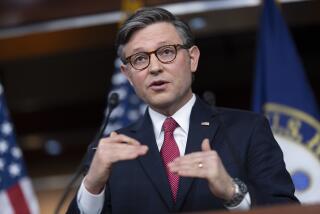U.S.-Indian Nuclear Deal No Shoo-In
WASHINGTON â The Bush administrationâs proposed nuclear deal with India is meeting with a chilly reception from lawmakers, who are predicting that instead of swift approval, the initiative faces revisions and delays, if not outright rejection.
The White House had hoped to win congressional approval by the end of May for the deal, which would open the way for cooperation on Indiaâs civil nuclear program, and is also designed to begin a new strategic relationship between the United States and a populous, economically vibrant democracy.
But the initiative has found few high-profile champions on Capitol Hill or elsewhere, while becoming a target for criticism from the right and left that it could further undermine international efforts to stem the spread of nuclear weapons.
Since the deal was announced March 2, key lawmakers such as Sen. Richard G. Lugar (R-Ind.), chairman of the Senate Foreign Relations Committee, and Rep. Henry J. Hyde (R-Ill.), chairman of the House International Relations Committee, have remained carefully neutral.
Meanwhile, Rep. Duncan Hunter (R-El Cajon), chairman of the House Armed Services Committee, said this month that the president âis trying to ride a nuclear tiger.... Iâm skeptical.â
Former Sen. Sam Nunn (D-Ga.), a respected voice on security issues, also has voiced concerns and urged lawmakers to remain skeptical.
âIt may be going too far to say thereâs panic within the administration, but I think thereâs deep concern that it hasnât been received nearly as well as hoped,â said a Republican House staff member, who spoke on condition of anonymity because of the political sensitivity. âTheyâre trying to create the impression of momentum. Frankly, I donât think itâs there.â
The legislation before Congress would lift rules barring the U.S. government from providing nuclear technology to countries such as India that have declined to sign the Nuclear Nonproliferation Treaty. In return for such help, India would agree to allow international inspections of its civilian reactors, though its military weapons program would remain unmonitored.
President Bush contends that by selling nuclear reactors to India, the program would ease competition for oil, help the environment and provide important new U.S. commercial ties. Administration officials also want to foster a better relationship with India because they believe it can be a strategic counterweight to China.
To provide India with nuclear knowledge, the United States must also win approval from a group of nations, known as the Nuclear Suppliers Group, that controls the international nuclear trade. But in a meeting last weekend, the India proposal drew questions from representatives of many of the countries, and the administration failed to win permission to put the deal on the agenda for the groupâs May meeting, as it had hoped to do.
Administration officials, who have been intensively lobbying Congress this month, have said that attempts to add conditions to the agreement could destroy a carefully crafted deal. R. Nicholas Burns, undersecretary of State for political affairs, said in an appearance this week before the Council on Foreign Relations that the administration could accept conditions that would improve the deal âas long as they donât require us to go back and break the agreement, reopen negotiations.â
But legislators say theyâre likely to add conditions anyway. Indian Foreign Secretary Shyam Saran, in Washington this week to meet with lawmakers, seemed to accept that some changes were likely. In a speech to the Heritage Foundation, a conservative think tank, Saran said New Delhi could accept revisions as long as they did not upset the âdelicate balanceâ of the proposal.
Although it is not yet clear what kind of amendments Congress might seek, it could demand assurances that India would vigorously enforce its export controls on nuclear technology, or press to require New Delhi to put any new fast-breeder reactors, which produce material for bombs, under international monitoring. Congress also might try to insist that India halt production of nuclear materials, as the United States and other leading atomic powers have done.
But India, which is building a nuclear arsenal in part as protection against China, has signaled that an attempt to impose such limits âwould be a deal breaker,â said the Republican staff member.
If Congress doesnât act before the summer recess, the administration could face a tougher challenge because of the difficulty of pushing through such a controversial agreement just before a midterm congressional election. Then the deal, which aides consider one of the most important accomplishments of the Bush presidency, could be put on hold until next year.
One State Department official, speaking on condition of anonymity in keeping with agency rules, insisted that the administration was finding support for the deal on Capitol Hill and from countries such as Britain, Russia, France and Australia.
âBut we realize we have some questions to address,â he said.
More to Read
Sign up for Essential California
The most important California stories and recommendations in your inbox every morning.
You may occasionally receive promotional content from the Los Angeles Times.











